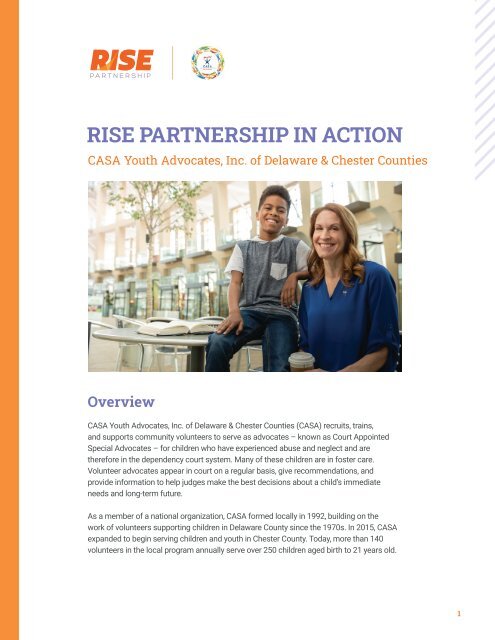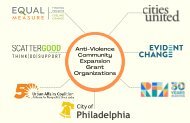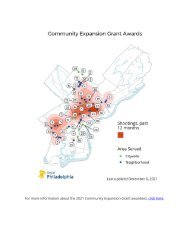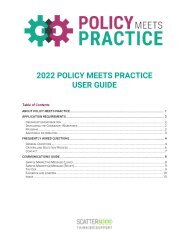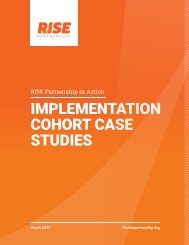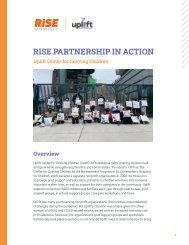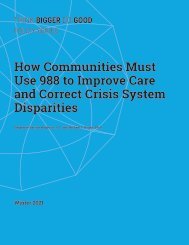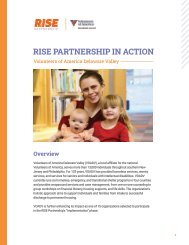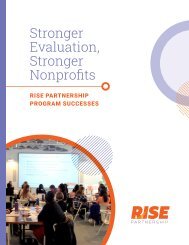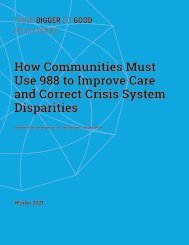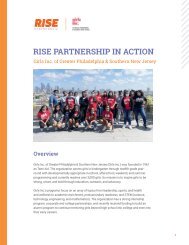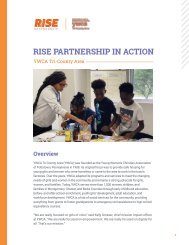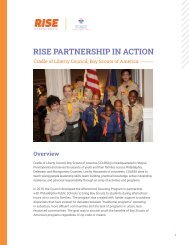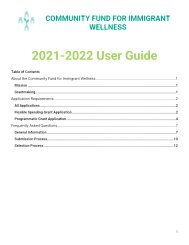RISE Partnership in Action: CASA Youth Advocates, Inc. of Delaware and Chester Counties
- No tags were found...
You also want an ePaper? Increase the reach of your titles
YUMPU automatically turns print PDFs into web optimized ePapers that Google loves.
<strong>RISE</strong> PARTNERSHIP IN ACTION<br />
<strong>CASA</strong> <strong>Youth</strong> <strong>Advocates</strong>, <strong>Inc</strong>. <strong>of</strong> <strong>Delaware</strong> & <strong>Chester</strong> <strong>Counties</strong><br />
Overview<br />
<strong>CASA</strong> <strong>Youth</strong> <strong>Advocates</strong>, <strong>Inc</strong>. <strong>of</strong> <strong>Delaware</strong> & <strong>Chester</strong> <strong>Counties</strong> (<strong>CASA</strong>) recruits, tra<strong>in</strong>s,<br />
<strong>and</strong> supports community volunteers to serve as advocates – known as Court Appo<strong>in</strong>ted<br />
Special <strong>Advocates</strong> – for children who have experienced abuse <strong>and</strong> neglect <strong>and</strong> are<br />
therefore <strong>in</strong> the dependency court system. Many <strong>of</strong> these children are <strong>in</strong> foster care.<br />
Volunteer advocates appear <strong>in</strong> court on a regular basis, give recommendations, <strong>and</strong><br />
provide <strong>in</strong>formation to help judges make the best decisions about a child’s immediate<br />
needs <strong>and</strong> long-term future.<br />
As a member <strong>of</strong> a national organization, <strong>CASA</strong> formed locally <strong>in</strong> 1992, build<strong>in</strong>g on the<br />
work <strong>of</strong> volunteers support<strong>in</strong>g children <strong>in</strong> <strong>Delaware</strong> County s<strong>in</strong>ce the 1970s. In 2015, <strong>CASA</strong><br />
exp<strong>and</strong>ed to beg<strong>in</strong> serv<strong>in</strong>g children <strong>and</strong> youth <strong>in</strong> <strong>Chester</strong> County. Today, more than 140<br />
volunteers <strong>in</strong> the local program annually serve over 250 children aged birth to 21 years old.<br />
1
“[<strong>RISE</strong>] really helped us take a lot <strong>of</strong> data that was<br />
already <strong>in</strong> some format <strong>and</strong> look at it <strong>in</strong> a way that<br />
was mean<strong>in</strong>gful.<br />
Leigh Anne McKelvey, Executive Director at <strong>CASA</strong><br />
Children with an advocate are more likely<br />
to f<strong>in</strong>d a safe, permanent home, succeed<br />
<strong>in</strong> school, <strong>and</strong> they are half as likely to<br />
re-enter the foster care system.<br />
<strong>CASA</strong> is further enhanc<strong>in</strong>g its impact<br />
as one <strong>of</strong> 15 organizations selected<br />
to participate <strong>in</strong> the <strong>RISE</strong> <strong>Partnership</strong>’s<br />
“Implementation” phase.<br />
<strong>CASA</strong>’s work with <strong>RISE</strong> started with the<br />
development <strong>of</strong> a logic model, a process<br />
the organization had never gone through<br />
<strong>in</strong> detail before. After several iterations,<br />
the logic model is now ready to share with<br />
funders <strong>and</strong> guides <strong>in</strong>ternal checks <strong>of</strong> the<br />
organization’s work <strong>and</strong> practices.<br />
“Not only did we get a logic model on<br />
paper describ<strong>in</strong>g the pathway that our<br />
work takes <strong>and</strong> what it takes to be<br />
impactful <strong>and</strong> successful <strong>in</strong> our work,<br />
but go<strong>in</strong>g through that process actually<br />
helped us better underst<strong>and</strong> those steps<br />
ourselves,” said Leigh Anne McKelvey,<br />
executive director at <strong>CASA</strong>. “I <strong>in</strong>herited<br />
one when I became the executive director<br />
but, look<strong>in</strong>g back now, know<strong>in</strong>g what I<br />
know about develop<strong>in</strong>g logic models, I<br />
wouldn’t even say it was a logic model.”<br />
Follow<strong>in</strong>g the logic model process,<br />
<strong>CASA</strong> started to look deeper <strong>in</strong>to its<br />
data collection <strong>and</strong> analysis process.<br />
The organization started question<strong>in</strong>g<br />
the data it collects <strong>and</strong> what should be<br />
done with it.<br />
“[<strong>RISE</strong>] really helped us take a lot <strong>of</strong> data<br />
that was already <strong>in</strong> some format <strong>and</strong> look<br />
at it <strong>in</strong> a way that was mean<strong>in</strong>gful,” said<br />
McKelvey. “And also helped us focus <strong>in</strong><br />
on ‘what do we truly need to be track<strong>in</strong>g<br />
<strong>and</strong> what is unnecessary’?”<br />
This new approach to data collection<br />
<strong>and</strong> analysis led <strong>CASA</strong> to start look<strong>in</strong>g<br />
at outcomes by various demographics<br />
like age, gender, race, <strong>and</strong> cultural<br />
background. The organization wanted<br />
to answer questions like: Who is most<br />
vulnerable? Who is most likely to have<br />
the worst outcomes? And who is most<br />
likely to have a difficult journey through<br />
the child welfare system?<br />
From there, advocacy practices <strong>and</strong><br />
<strong>in</strong>terventions could be tailored to better<br />
support children’s needs.<br />
“We wanted to tailor our advocacy so<br />
that we can do everyth<strong>in</strong>g we can to<br />
better those outcomes,” said McKelvey.<br />
“We’re <strong>in</strong> the process <strong>of</strong> really look<strong>in</strong>g at<br />
how we appropriately tra<strong>in</strong> people who<br />
are go<strong>in</strong>g to become their advocates to<br />
be the best advocate possible.”<br />
2
“ Not only is it help<strong>in</strong>g us to improve our services<br />
<strong>in</strong>ternally, but we used the data we collected by<br />
demographics to propose <strong>and</strong> launch a task force for<br />
<strong>Delaware</strong> County’s Child Welfare System around equity.<br />
Leigh Anne McKelvey, Executive Director at <strong>CASA</strong><br />
<strong>CASA</strong> found that children <strong>of</strong> color,<br />
particularly African American children<br />
(<strong>and</strong> specifically African American<br />
teenage girls) were the most marg<strong>in</strong>alized<br />
group, with the most time <strong>in</strong> foster care,<br />
most number <strong>of</strong> placements, or most<br />
likely placed <strong>in</strong> residential care.<br />
“Really every data po<strong>in</strong>t you can th<strong>in</strong>k <strong>of</strong> <strong>in</strong><br />
child welfare, their outcomes were worse<br />
than their white counterparts or their male<br />
counterparts,” expla<strong>in</strong>ed McKelvey.<br />
<strong>CASA</strong> wasn’t conv<strong>in</strong>ced that this data<br />
was unique to their local program, but<br />
rather reflective <strong>of</strong> a larger problem<br />
<strong>in</strong> the child welfare system. So the<br />
organization launched the Equity Child<br />
Welfare Task Force consist<strong>in</strong>g <strong>of</strong> <strong>CASA</strong>,<br />
Children <strong>and</strong> <strong>Youth</strong> Services, as well as<br />
the Dependency Court judge, attorneys,<br />
<strong>and</strong> community leaders who work <strong>in</strong> the<br />
county’s child welfare system. The task<br />
force exam<strong>in</strong>ed data at the county level<br />
<strong>and</strong> found similar disparities to <strong>CASA</strong>.<br />
“Not only is it help<strong>in</strong>g us to improve our<br />
services <strong>in</strong>ternally, but we used the data<br />
we collected by demographics to propose<br />
<strong>and</strong> launch a task force for <strong>Delaware</strong><br />
County’s Child Welfare System around<br />
equity,” said McKelvey.<br />
The task force also conducted a best<br />
practices scan to learn what other child<br />
welfare programs across the country<br />
were do<strong>in</strong>g to advance equity <strong>in</strong> their<br />
systems. As a result <strong>of</strong> the learn<strong>in</strong>gs,<br />
<strong>CASA</strong> advocated to br<strong>in</strong>g a series <strong>of</strong><br />
pr<strong>of</strong>essional development tra<strong>in</strong><strong>in</strong>gs to<br />
3
child welfare stakeholders, <strong>in</strong>clud<strong>in</strong>g<br />
attorneys <strong>and</strong> case workers. The impact<br />
<strong>of</strong> <strong>RISE</strong> extended beyond <strong>CASA</strong> to the<br />
entire countywide child welfare system.<br />
“We advocated to br<strong>in</strong>g a series <strong>of</strong><br />
cont<strong>in</strong>u<strong>in</strong>g education opportunities<br />
around diversity, equity, <strong>and</strong> <strong>in</strong>clusion,”<br />
said McKelvey. “It really had ripple effects<br />
at a systemic level <strong>and</strong> at a countywide<br />
level, the work that we started with <strong>RISE</strong><br />
three years ago.”<br />
With the help <strong>of</strong> <strong>RISE</strong>, <strong>CASA</strong><br />
accomplished a lot <strong>in</strong> three years<br />
– but believes it can do much more.<br />
“I look at it as just the beg<strong>in</strong>n<strong>in</strong>g <strong>of</strong> the<br />
journey <strong>and</strong> sett<strong>in</strong>g us on the right path,”<br />
said McKelvey. “It’s a long process <strong>and</strong><br />
a long-term journey, but I’m excited about<br />
where we’re at <strong>and</strong> where we’re try<strong>in</strong>g<br />
to go.”<br />
Established <strong>in</strong> 2018, The <strong>RISE</strong> (Read<strong>in</strong>ess, Implementation, Susta<strong>in</strong>ability for Effectiveness) <strong>Partnership</strong> supports promis<strong>in</strong>g<br />
Greater Philadelphia <strong>and</strong> Southern New Jersey nonpr<strong>of</strong>it organizations. The <strong>RISE</strong> <strong>Partnership</strong> Evaluation Funders Learn<strong>in</strong>g<br />
Community is the first conven<strong>in</strong>g supported by a network <strong>of</strong> funders <strong>in</strong> the region. The Learn<strong>in</strong>g Community is a collaborative<br />
effort with the Barra Foundation, Campbell Soup Company, Horner Foundation, Nelson Foundation, Philadelphia Foundation,<br />
PropelNext/Edna McConnell Clark Foundation, Scattergood Foundation, <strong>and</strong> United Way <strong>of</strong> Greater Philadelphia <strong>and</strong> Southern<br />
New Jersey, <strong>and</strong> a partnership with YaleEVAL <strong>of</strong> The Consultation Center at Yale. The <strong>Partnership</strong> provides nonpr<strong>of</strong>its with<br />
resources <strong>and</strong> tra<strong>in</strong><strong>in</strong>g to strengthen organizational effectiveness <strong>and</strong> ensure a greater impact on social, economic, health, <strong>and</strong><br />
educational conditions <strong>in</strong> communities, <strong>in</strong>clud<strong>in</strong>g the effects <strong>of</strong> racism, <strong>in</strong>tergenerational poverty <strong>and</strong> trauma.<br />
For more <strong>in</strong>formation visit therisepartnership.org


